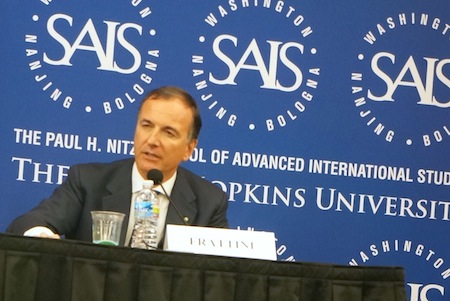Former center-right foreign minister Franco Frattini is far from the fray of Italian politics these days — he didn’t run in last week’s Italian elections and he’s currently a candidate to replace Anders Fogh Rasmussen as the secretary general of the North Atlantic Treaty Organization.![]()
![]()
Nonetheless, Frattini (pictured above) spoke in Washington yesterday to the American Israel Public Affairs Committee as well as to a small audience at Johns Hopkins University’s School of Advanced International Studies, and amid a set of thoughtful remarks about Italy’s election and its post-vote gridlock, one remark stood out in particular — that Italy should revise its electoral law by adopting the system currently in use by France, a two-round system whereby deputies are elected in single-member constituencies.
When election results came in last Monday, despite pre-election polls showing that the broad centrosinistra (center-left) coalition headed by Pier Luigi Bersani would win, returns showed Bersani’s coalition doing poorer than expected. The broad centrodestra (center-right) coalition headed by former prime minister Silvio Berlusconi and the anti-establishment, anti-austerity Movimento 5 Stelle (M5S, the Five Star Movement) founded by blogger and activist Beppe Grillo, both polled much better than expected — so much so that Italy now has a hung parliament. A centrist coalition headed by outgoing technocratic prime minister Mario Monti placed far behind in fourth place.
A ‘winner bonus’ for Bersani in Italy’s lower house, Camera dei Deputati (House of Deputies), based on the fact that his coalition (just barely) won a greater number of votes than any other coalition or party, means that the center-left will command a 340-seat absolute majority in the Camera.
But because seats are awarded on a regional basis to Italy’s upper house, the Senato (Senate), no one emerged with anything close to a majority — and it became clear that even a widely mooted Bersani-Monti coalition would fall far short of a majority.
So election law reform has become a top-shelf issue in the wake of last week’s elections, not only because of the inconclusive result last week, but because it’s one of a handful of items that both Grillo and Bersani, the leader of the center-left Partito Democratico (PD, Democratic Party), agree upon, so reform could be a key element of any agenda that a short-term Bersani-Grillo alliance might enact before a new election.
Even members of Berlusconi’s Popolo della Libertà (PdL, People of Freedom) want to reform the election law, and even Roberto Calderoli, who pushed the law through the Italian parliament, has called it a ‘porcata,’ a pig’s dinner.
But agreeing that the election law is a mess and agreeing on a new law are two different things.
So what have Italy’s three most recent voting systems — the postwar open-list proportional representation system, the mixed, mostly first-past-the post system adopted in 1993, and the closed-list proportional representation system (with a ‘winner bonus’) adopted in 2005 — historically meant for stability or chaos in Italy’s parliament?
How does the French system vary from Italy’s current system?
And how would a French system work in Italy?
Continue reading How would Italian politics function under a ‘French’ electoral system?
